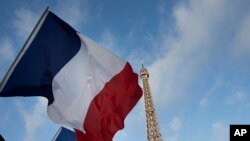The recent Paris attacks were largely condemned by media in Muslim and Arabic countries, but some pundits writing in local languanges saw it differently, putting the blame not on Islamic State militancy but on the West and its values.
Turkish commentator Fehim Tastekin, who works for the independent daily Radikal, wrote that the “birth certificate” of IS was prepared by the United States and its allies after the Iraq invasion in 2003. He blames Saudi Arabia, an oil rich Gulf country that is a close ally to the United States and France, for financing Salafist ideology which is the backbone of IS militant theology.
Hurriyet, one of the most read newspapers in Turkey, ran the headline “Liberté, égalité, fraternité- against terror” and on the daily Zaman’s front page, “We condemn terrorism” was written in 13 different languages.
Conservative Turkish media backlash
But a majority of conservative media in Turkey, where press often is hindered by government restrictions, criticized France and the West.
Hurriyet columnist, Ahmet Hakan, who was attacked in front of his home in October, criticized how little amount of international reaction that recent bombings in Beirut and Ankara received compared to the Paris attacks.
The newspaper Vahdet criticized France for sheltering Kurdish terrorists and criticized the French president for receiving Turkish Kurdish party leaders in his palace on Sunday. The Monday edition of the newspaper ran an article titled “Islam is the target,” and said that “9/11 and the latest Paris attacks are aimed at hindering people from choosing Islam.”
The news outlet Akit used harsher language in criticizing France with a headline saying “they burned places, so they got burned.”
‘‘The attacks happened as a result of France’s Libya airstrikes,” the newspaper wrote.
The news web site Milli Gazete echoed a similar theme with a headline “Boomerang.” “Those bombs you shoot turn around and hit you at home,” the report said. “France sowed the wind and is now reaping the whirlwind.’’
Attacks Mirror IS Mayhem in Middle East
In some quarters of the Arabic and Middle East media, commentators wrote the Paris attacks were mirrors of the mayhem IS spreads in Iraq and Syria.
“France experienced what Syria has lived with the last five years,” the Iranian Kaihan newspaper wrote.
Syrian rights activists were alarmed by the attacks in Paris and worried that as Russia and the Western coalition step up attacks against IS, Syrian President Bashar al-Assad will remain in power.
Syrian rights activist Ziad al-Tai said on the Masralarabia website that Assad wants to exploit the Paris attacks for his own advantage and strengthen his rule in Syria.
In the Kurdish territories, there was much speculation about whether the Paris attacks would lead to an increased assault on IS stronghold in Iraq and Syria. But there were some media comments saying that France brought the tragedy on itself.
Kurdish commentator Aras Qadir wrote on the independent Pasewan website that France is also at fault for the attacks because of what he termed an assimilation policy to force other minorities become a part of the French mainstream culture.
The author contrasts French policies towards minorities, saying that British and Canadian models offer a better environment for minorities to exercise their rights.
Pakistani Media Spreads Blame
In Pakistan, local newspaper editorials also widely blamed Westerns policies towards the Middle East for the Paris attacks.
Nawa-e-Waqt, a leading Pakistani daily condemned the Paris attacks in an editorial, but characterized it as a “reaction” to U.S. interventions in Iraq and Afghanistan. The editorial called IS an “equal danger” for the Muslim world as it is for the Western world.
The Urdu daily Express asked for a joint policy against IS from Europe and the United States and urged Saudi Arabia, Pakistan and other Muslim nations to be part of coalition against the Islamic militants.
Other editorials warned the West of reactionary and hasty responses to the Paris attack and said they will not be constructive in resolving the conflict in the Middle East.
Afghan Media Grows Silent
In Afghanistan, the Paris attacks received wide, albeit short lived, media coverage.
Major television networks, including Tolonews and 1TV, led their nightly newscasts with the news and provided follow up analysis, while leading newspapers put the story above the fold.
Statements of condemnation and condolences issued by the Afghan government were widely carried.
Some networks reached out to Afghans in Europe for an assessment of the attacks and whether they would further inflame European xenophobia and make life difficult for refugees.
Salam Watandar, a national radio network, interviewed several analysts on whether the Paris attacks would lead to a reassessment of Western anti-terror policies.
“The attacks will strengthen the hands of Islamophobes and can be a warning to refugees in Europe,” one analyst told the network.
Others were more critical.
In an editorial titled “Airstrikes Alone Won’t Eliminate Terrorism,” the newspaper 8AM argued that if the West is serious about combating terrorism, it must rein in its allies in the Middle East.
This story was compiled from reports produced by VOA’s language services and VOA’s Extremism Watch Desk





